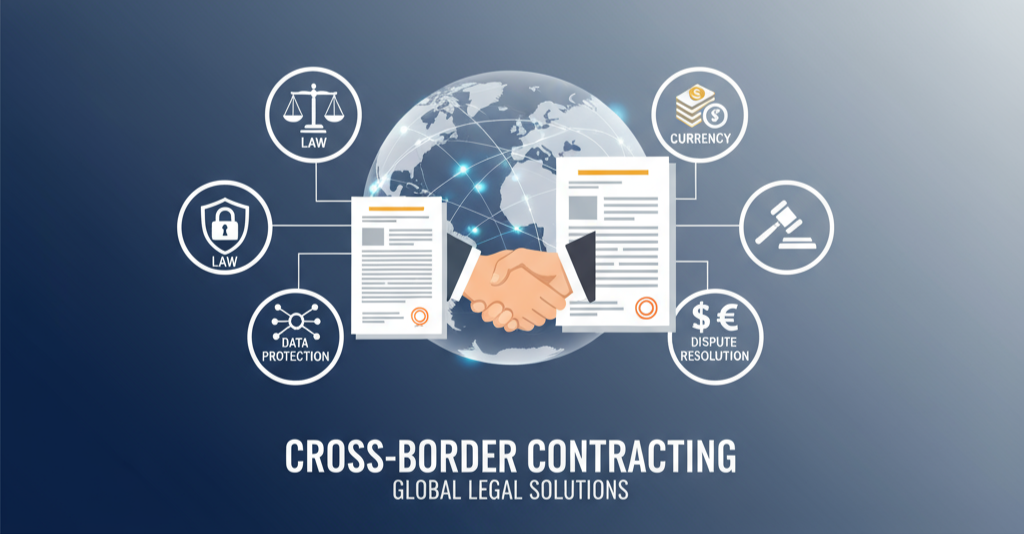Navigating contracts that span multiple countries demands careful planning around legal, regulatory, linguistic and cultural differences. A comprehensive approach minimises disputes, maintains compliance and builds resilient partnerships. This guide presents ten best practices for any business operating across borders.
1. Conduct Comprehensive Due Diligence
Identify and assess every counterparty before signing:
- Verify legal status, reputation and financial health.
- Check sector-specific licences, registrations or approvals in each jurisdiction.
- Use official registry searches and independent credit or compliance reports.
Thorough vetting prevents enforceability and credit-risk issues down the line.
2. Define Governing Law and Jurisdiction
Clarify which legal system applies:
- Specify the governing law (for example, “This Agreement is governed by the laws of the Republic of Singapore”).
- Choose an exclusive forum for disputes (courts or arbitration seats).
- Consider neutral venues like Switzerland, Singapore or Hong Kong for truly international parties.
A precise choice-of-law clause reduces uncertainty over interpretation and enforcement.
3. Choose Effective Dispute Resolution
Structure a clear path to resolve conflicts:
- Require initial negotiation or mediation (for example, through ICC Mediation).
- Opt for arbitration under ICC, LCIA, SIAC or UNCITRAL rules for enforceability under the New York Convention.
- Define language, seat and procedure to streamline timing and costs.
Well-defined dispute resolution saves relationships and limits legal fees.
4. Address Data Protection and Privacy Laws
Ensure compliance with major privacy regimes:
- Incorporate EU GDPR and UK GDPR obligations if handling EU/UK data.
- Address US state privacy laws (e.g., CCPA/CPRA) when processing California residents’ information.
- Include standard contractual clauses or binding corporate rules for international data transfers.
- Consider APPI in Japan, PDPA in Singapore and other local regulations.
This protects personal data and avoids regulatory fines.
5. Incorporate International Trade and Tax Provisions
Clarify import/export and tax responsibilities:
- Reference Incoterms 2020 for delivery, insurance and risk transfer.
- Specify customs duties, GST/VAT, export licences and trade-compliance obligations.
- Address withholding tax, permanent establishment risks and transfer-pricing requirements.
A detailed trade clause prevents unexpected duties and tax assessments.
6. Manage Currency and Payment Terms
Lock in clear financial arrangements:
- State the transaction currency (USD, EUR, local currency) and exchange-rate conventions.
- Define payment methods (wire transfer, escrow, letters of credit) and net-days (commonly 30–60).
- Provide for FX adjustments, hedging or price-review mechanisms.
Transparent terms minimise foreign-exchange exposure and payment disputes.
7. Include Force Majeure for Unforeseeable Events
Cover global disruptions:
- Enumerate force-majeure events (natural disasters, wars, sanctions, pandemics).
- Set notice requirements and rights to suspend or terminate obligations.
- Align with UNCITRAL or ICC model clauses for uniformity.
Robust clauses accommodate sudden legal or logistical shutdowns.
8. Protect Intellectual Property and Confidentiality
Guard your innovations and know-how:
- Assign, license or reserve IP rights explicitly, covering patents, copyrights, designs and trademarks.
- Insert non-disclosure and confidentiality obligations, with durations and exclusions spelled out.
- Use a standard cross-border NDA template to ensure consistency.
Clear IP and secrecy provisions preserve competitive advantage.
9. Localize Language and Cultural Adaptation
Eliminate ambiguity and build rapport:
- Provide dual-language versions where parties speak different languages.
- Draft in plain language and define critical terms to avoid misinterpretation.
- Respect local negotiation styles, formalities and regulatory customs.
Cultural sensitivity fosters trust and reduces friction.
10. Utilize Local Counsel and Centralize Contract Management
Blend global oversight with local expertise:
- Engage qualified counsel in each jurisdiction for compliance reviews.
- Adopt a contract-management system to track versions, obligations and renewal dates.
- Automate alerts for key milestones, regulatory updates and performance metrics.
Technology and local insight ensure consistent compliance worldwide.
Frequently Asked Questions
How do I pick a neutral governing law?
Choose a jurisdiction known for impartial courts and established case law, such as Singapore, Switzerland or England and Wales.
What’s required for GDPR compliance in a global contract?
Include data-processing terms, data-transfer safeguards (SCCs or BCRs) and specify roles for controllers and processors.
Is arbitration always better than litigation?
Arbitration offers confidentiality, finality and cross-border enforceability but may cost more than court proceedings in some regions.
How detailed should my force majeure clause be?
List specific events, set clear notice procedures and outline parties’ rights to suspend, extend or terminate obligations.
Should I translate my contracts?
If parties speak different languages, dual-language versions with an agreed-upon controlling text reduce misunderstanding.
By following these best practices, businesses can draft and manage cross-border contracts with confidence—minimizing legal risks, protecting critical assets and fostering seamless collaboration across jurisdictions.



